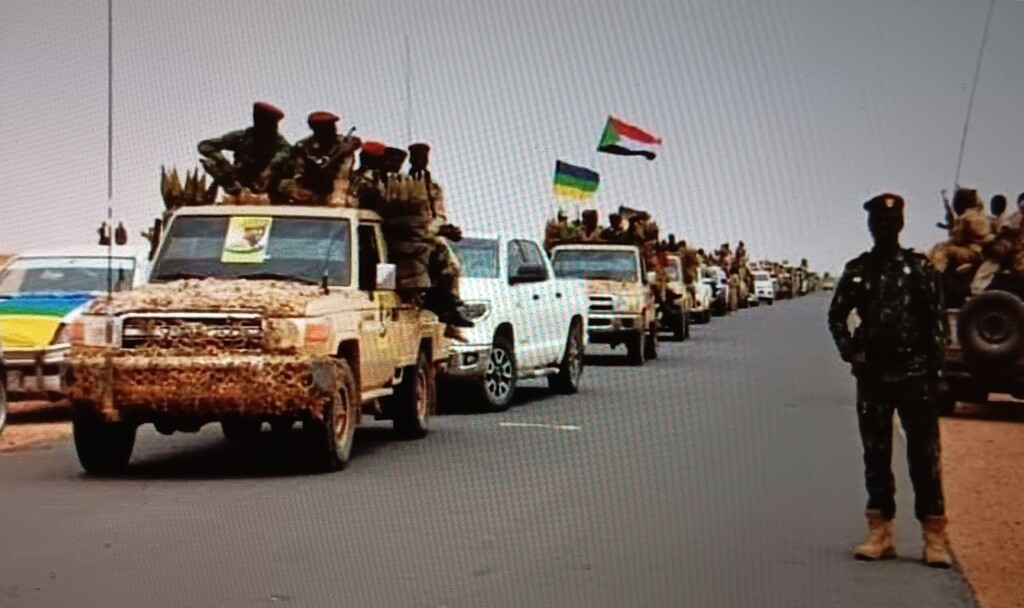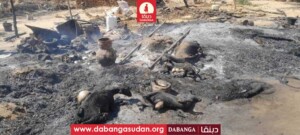Sudan Transparency and Policy Tracker: ‘RSF exploiting North Darfur trade route’

Members of the Darfur Joint Protection Force (DJPF) secures a convoy on its way to El Fasher, November 2023 (Photo: DJPF)
In a new report, the Sudanese Transparency and Policy Tracker (STPT) indicates that since taking control of Mellit, North Darfur, last month, the Rapid Support Forces (RSF) has “used the town as a base to control the flow of goods into Darfur and to extract resources from trade”.
In a report titled ‘The Military, Economic, and Humanitarian Consequences of the RSF’s Control of Mellit, North Darfur’, published on May 15, the Sudanese Transparency and Policy Tracker sheds light on the recent developments in North Darfur following the RSF takeover of Mellit last month. The report highlights the multifaceted impact of this strategic move, particularly in terms of military dominance, economic exploitation, and humanitarian implications.
Mellit is located approximately 60 kilometres from the North Darfur capital, El Fasher, and is positioned at a crucial junction linking El Fasher to Kufra, in southeastern Libya, and Ed Debba, in the Sudanese Armed Forces (SAF)-held Northern state.
The town now serves as a pivotal base for the RSF to control cross-border trade routes, especially those originating from Libya. This control allows the RSF to smuggle vital resources such as fuel and weapons, essential for sustaining the conflict, thus strengthening their military position, STPT argues.
‘Porous border’
Sudan’s borders with Libya and Chad have long served as conduits for illicit trade in arms, ammunition, and contraband goods, according to STPT. The strategic location of Mellit, situated at the crossroads between Libya and Chad, has facilitated the flourishing of smuggling networks, with arms, drugs, alcohol, and other illicit goods making their way through porous borders.
The flow of goods into Darfur has been significantly disrupted since the outbreak of war in April 2023, with transportation along the Western Salvation Road interrupted after some Darfur movements renounced their neutrality and aligned themselves with the SAF. Mellit emerged as an alternative route for supplying the region during this time.
Prior to the RSF takeover, local governments relied on levies and fees for financing, with revenue often failing to translate into adequate services for communities. RSF control of Mellit has led to increased fees and obstacles along these routes, further straining trade and contributing to price hikes on essential commodities.
The establishment of RSF toll gates at security checkpoints along these trade routes enables them to impose illegal fees on incoming trucks carrying essential supplies like food and medicine. The RSF redirects revenue from levies primarily towards security needs, according to STPT.
This practice not only escalates commodity prices across Darfur but also restricts access to critical goods, exacerbating the humanitarian crisis in the region made worse by the siege on El Fasher, the report states.
Aid blockade
The RSF refuses to allow humanitarian aid through vital routes controlled by SAF and their allies. This, coupled with disruptions to commercial traffic between Kufra and Mellit, has further restricted aid flow into Darfur.
The blockade has also led to a steep rise in commodity prices, with essentials like sugar and rice becoming increasingly unaffordable for residents. Moreover, the disruption of transportation networks has hampered the operation of essential services like water stations and grain mills.
According to knowledgeable sources who spoke to STPT, the RSF is preparing to establish a unified administration in western and central Sudan, consolidating their control over the region. This move is seemingly driven by a desire to monopolise the flow of humanitarian aid and exert complete authority over territories under their sway.
“If the RSF go ahead and declare a civil administration in the areas under their military control, this will create a reality in Sudan similar to the situation in Libya, with the actual division of the country into two competing administrations at the expense of its unity,” the report laments.
The watchdog organisation concluded by saying “the RSF tactics aim at preventing the supply of SAF in El Fasher at any cost, regardless of the suffering caused to civilians, directly contributing to exacerbating the food crisis in the city and the entire region. Such tactics have already resulted in an escalation in the number of deaths of children suffering from malnutrition in [camps for the displaced].”











 and then
and then